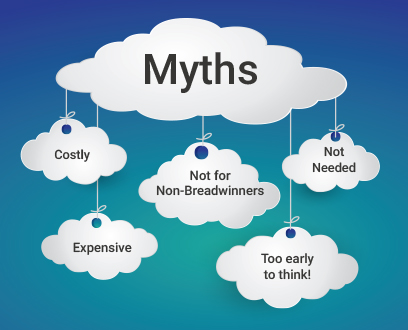20 Life Insurance Myths Debunked
There are a lot of myths associated with Life Insurance, so we’ve decided to break some of them down in order to help you understand the most common misconceptions regarding Life Insurance, but also to allow you to make better informed decisions regarding your own Life Insurance policy choices!
Myth #1 “I Do Not Have Any Dependents, And I Am Single, So I Don’t Need Life Insurance!”
Myth Debunked: Even single people need Life Insurance! At the very least, obtaining just enough coverage to cover your personal, medical, and funeral costs is a wise thing to do. Especially if you’re uninsured, you could potentially leave behind a slew of unpaid expenses for your family or your executor to have to take care of. If you have a mortgage, student loans, medical debt, etc., even as a single person with no dependents, it is a smart move to secure Life Insurance, so these things aren’t absorbed by a loved one. Another advantage would be that this is a great way for any low-income single people to leave a legacy to a favorite charity or other cause, but most importantly, you don’t want to leave your unpaid expenses for a loved one to deal with, under an already stressful time.
Myth #2 “The Choices and Options Are Too Overwhelming!”
Myth Debunked: It’s true that there are many varieties of Life Insurance, but for most people the best choice is Term Life Insurance, which is pretty straight-forward. With Term Life, you determine the amount of coverage, let’s say $250,000 or $500,000, and you choose the timespan for your protection, such as 10, 20, or 30 years. If you pay your monthly premiums and die within the term, your beneficiary will receive the money. The more assets or debt you have, it can start to get a little more complicated in which an experienced and licensed agent or broker could help guide you to find a policy that suits your requirements.

Myth #3 “It’s Just Too Expensive!!”
Myth Debunked: This is probably one of the biggest misconceptions regarding Life Insurance! A survey done showed at least 80% of the survey takers overestimated the cost for a given policy. Many people think it is more expensive than it is, for protection that they truly need. This is particularly true in the case of Millennials, who overestimated the cost of Life Insurance by 213% on average, and Generation X overestimated by 119%. When they were asked the annual price for a 20 year, $250k term life insurance policy, for a healthy 30-year-old, respondents gave a median estimate of $400. Millennials put it at about $600. The actual price is about $160 annually.
Myth #4 “If You Are Young and Healthy, You Don’t Need Coverage!”
Myth Debunked: Your need for Life insurance depends on several factors, but if possible, it’s better to buy a policy when you’re young and healthy, and it costs the least. For example, a policy that costs $12 a month at age 30 will cost about $32 a month at age 50. You’re more likely to develop health issues as you age, and because of this, the price increases. A person who buys a policy in their 30’s while healthy may end up with a terminal illness in their 40’s and would likely not be able to obtain the same insurance today. A saying goes “He’s lucky that he bought insurance when he didn’t need it” because when it came down to it, he did have the coverage, it was affordable and when he eventually passes his family will be taken care of, as opposed to having to shop for a policy after the diagnoses, that now requires the insurer take his illness into account.
Myth #5 “My Life Insurance Coverage Only Needs to Be Twice My Annual Salary!”
Myth Debunked: Life Insurance that covers twice your annual salary is indeed a good starting point, especially if this is a plan offered by your employer, however, the amount of Life Insurance that is actually needed would vary on each person’s specific and individual circumstances. There are a lot of factors to consider when you’re deciding how much coverage is appropriate. In addition to medical and funeral costs, you may need to pay off debt such as mortgage and provide for your family for several years. A Cash Flow Analysis is usually necessary to determine the true amount of insurance needed. For example, let’s say your annual salary is $40,000. Twice that would make $80,000, however let’s say your mortgage still has $45,000 left to be paid off, then add in funeral cost, medical expenses, and other arrangements needing to be made and suddenly that $80,000 goes a lot faster than it sounds, and if the Insurance cannot cover all of these expenses than it would fall into the laps of your loved ones or your executer to assume the debt. It is worth considering your specific needs, versus the blanket statement of “twice your annual salary”, however with all that said, it’s better than no coverage at all.
Myth #6 “My Term Life Insurance Policy from Work Is Sufficient Coverage!”
Myth Debunked: It might be, but it also might not be. For a single person of more modest means, employer-paid or employer-provided term coverage may be enough, but if you have a spouse or a dependent, or if you know that you will need coverage upon your death to pay taxes, or additional expenses, then additional coverage may be necessary. If you are reasonably unable to obtain extra coverage, your employer-provided coverage, again, is better than no coverage.
Myth #7 “My Premium Costs Will Be Deductible!”
Myth Debunked: In most cases, I’m afraid not. The cost of personal Life Insurance is never deductible unless the policy-holder is self employed and the coverage is used as asset protection for the business owner. In this case the premiums are deductible on Schedule C of the Form 1040.
Myth #8 “I Must Have Life Insurance at Any and All Costs!”
Myth Debunked: In most cases this can be true. However, people with sizeable assets and no debt or dependents may be better off self-insuring. If you have your medical and funeral costs covered, as well as other assets, Life Insurance coverage can be optional.

Making sure you and your family are protected with Life Insurance IS affordable! Are you covered?
Myth #9 I Should Always Buy TERM, Then Invest the Difference!
Myth Debunked: Well, not necessarily. There are distinct differences between Permanent Life Insurance and Term Life Insurance, and the cost of Term Life Coverage can become prohibitively high in the later years. Therefore, those who know for certain they must be covered at death should at least consider permanent coverage. The total premium layout for a more expensive Permanent Life Insurance policy may be less than the ongoing premiums that could last for years longer with a less expensive Term Life Insurance Policy.
There is also the risk of non-insurability to consider, which could really be disastrous for those who know they will have estate tax issues and need Life Insurance to pay them. This risk can generally be avoided with Permanent Life Insurance, which becomes paid up after a certain amount of premium has been paid and remains in force until death.
Myth #10 Only the Family Breadwinner Need Life Insurance Coverage?
Myth Debunked: Nope! This is a dangerous misconception. The cost of replacing the formerly performed services provided by a deceased homemaker can be a lot higher than you think. Insuring against the loss of a homemaker makes perfect sense, especially when it comes to cleaning, and rising daycare costs, meal preparation, transportation, grocery shopping and other services provided by the homemaker. These services would either need to be replaced, or supplemented by a loved one, who may already be working themselves. Not surprisingly, these services can add up to be a lot, so properly implementing a Life Insurance Policy even on a non-breadwinner is still a smart move financially for your family.
Myth #11 Variable Universal Life Policies Are Always Better Than Straight Universal Life Policies Over The Long Run!
Myth Debunked: Many Universal Life Insurance policies pay competitive interest rates, and Variable Universal Life policies contain several layers of fees relating to both the insurance and securities elements present in the policy. Therefore, if the variable sub-accounts within the policy do not perform well, the variable policyholder may see a lower cash value than someone with a Straight Universal Life policy. Poor market performance can also generate substantial cash calls inside variable policies that require additional premiums to be paid to keep the policy in force.
Myth #12 On any Term Policy, I Should Always Purchase the Return-of-Premium (ROP) Rider on Any Term Policy!
Myth Debunked: There are typically different levels of Return-of Premium (ROP) riders available for policies that offer this feature. Many financial planners will tell you this rider is not really cost-effective and should actually be avoided. Whether you include this rider will depend on your risk tolerance and other possible investment objectives. Again, this is a place where a Cash Flow Analysis will reveal whether you could come out ahead by investing the additional amount of the rider versus including it in the policy.
Myth #13 I’m Better Off Investing My Money Than Buying Life Insurance!
Myth Debunked: Nonsense! Until you have reached the “break even” point of asset accumulation, you need life insurance cover of some kind (barring the exception we discussed in Myth #5) Once you amass about $1,000,000 of liquid assets, you can consider whether to discontinue (or at least reduce) your million dollar policy. You take a big chance when you depend solely on your investments in the earlier years of your life, especially if you have dependents. If you die without coverage for them, there may be no other means of providing after the depletion of your current assets.
Myth #14 If You Have Health Issues, You Won’t Be Able to Obtain A Policy!
Myth Debunked: Unless your health conditions are severe, you will generally be able to buy Term Life Insurance! Conditions such as Diabetes, Arthritis or even High Cholesterol will mean higher Lief Insurance Quotes, but Insurance is still within your grasp. For example, a 50-year-old man with high cholesterol and a family history of heart disease can still buy a 20-year, $250k policy for about $46 a month. It is not unattainable if you have health issues! One of the most difficult health issues to get around is ESRD( End-Stage Renal Disease) and even then, you can acquire a policy, but your premium will likely be much higher than that of someone with minor health complications and certainly more than a healthy person would pay.
Myth #15 Life Insurance Isn’t Available for Older People!
Myth Debunked: Even if you are older, say over 60, you can generally still buy a term Life Insurance policy unless you have a terminal illness. Your goals are likely a lot different from a 30-year-old’s, so you may want to think about a shorter-term policy to help your family with estate planning or buying out a business partner. The cost of coverage for older people, is of course, higher. Older people may also want to consider insurance for final expenses, which is offered by some companies. This generally offers a payout of about $50,000 or less and is designed to help pay off final debt and burial expenses.

Having Life Insurance gives your family and loved ones peace of mind knowing they won’t have to deal with financial burden should something happen.
Myth #16 You Get a Better Deal Buying Insurance Online!
Myth Debunked: Yes, the internet can be a great tool when researching Life Insurance and to find an agent or broker service! It brought you here, didn’t it?! However, typically you would likely pay the same price whether you purchased your policy online or through and agent or broker. The difference is, when purchasing online, you don’t get the personal service that can help you figure out what and how much coverage you need, which company is likely to give you the best price based on your current health, and what the terminology on the application means, helping you better understand your own coverage. A website may not realize that you need coverage for your whole life due to a child with special needs or that your health won’t qualify you for the rates offered by the lowest price company. Most importantly, a commission motivated agent or broker can help motivate you to get the policy as it’s something that is very easy to procrastinate on.
Myth #17 I Can’t Afford to Meet with An Agent or Broker!
Myth Debunked: Agents and brokers will offer you an exclusive appointment to go over your services and policy options for Life Insurance free-of-charge, so it really is beneficial to purchase through an experienced professional. The commission they make is provided by the insurer, not from you directly, so cost shouldn’t be a worry when considering speaking to a licensed and expert Insurance Professional.
Anyone who is working with a financial adviser can make the right choices with a little help. In fact, your financial adviser is the best person to turn to for advice on insurance, in our opinion, since the primary purpose of Life Insurance can be to protect your most important goals should the unexpected occur. He or she knows your family, your financial goals and your aspirations for the future and can help you choose insurance that best fits with your overall financial goals and budget.
Making any kind of financial decision, including buying life insurance, can seem daunting at first, but a little education and a detailed discussion with your financial adviser, agent, or broker can go a long way toward demystifying life insurance. With a little time and effort, you will soon be on the road toward protecting your most valuable assets and helping to ensure financial security not only for yourself, but for the next generation as well.
Myth #18 I Won’t Need Life Insurance Once My Kids Are Grown!
Myth Debunked: Life Insurance can help you in many different stages in your life. Life Insurance later in life has a number of great advantages, such as helping to relieve the burden of paying for final costs, paying for state estate taxes your beneficiaries or heirs may face, and paying off any debt you may have left behind. It could simply be placed to leave your children with an inheritance so that they can better their lives and futures.
Myth #19 If I Get a Term Life Insurance Policy, I Can’t Convert It to Permanent or Whole Life Insurance Policies!
Myth Debunked: It IS possible to convert some term Life Insurance policies into a Permanent Life Insurance policy, depending on the policy purchased. However, it’s still a good idea to speak to your agent or broker up front, as these types of term policies typically must be converted within a specific time frame. You may also come across additional requirements with a convertible term policy, such as increasing premiums. That all said, it is absolutely possible to convert a Term policy to a Perm Policy.

If you can’t be there to catch them, make sure you leave behind a safety net!
Myth #20 “I’m Not Going to Die Anytime Soon!”
Myth Debunked: This is my favorite! Unless you have a crystal ball, there is just no way to know what the future holds and when. Being prepared for the unexpected is the name of the game, as waiting until you KNOW you NEED it can bring higher premiums, and other issues, especially if your health has changed with age. Some with this line of thinking may respond “Well, I’ll buy Life Insurance tomorrow, or next month, or next year..” To which I typically respond with the information I mentioned above, that premiums increase with age. Let’s say for example you wait 5 years before obtaining Life Insurance. Depending on how old you are when you first made that choice, you will likely wind up paying significantly more, even if your health hasn’t yet declined. If it has, expect even higher premiums. Your parents raised you and while I’m sure they would love to take care of your affairs should something happen, it’s not likely something they included in their own financial plans as it’s typically not the order of expectation. This would leave your parents, or other loved ones responsible for your debts and final expenses at the least.
BONUS MYTH “If I don’t die, all that money is wasted!!!”
Myth Debunked: Life Insurance isn’t meant to be an investment, per-say, it’s about mitigating the most critical risk to your family. Think of it this way: Is homeowner’s insurance a waste if your house never burns down? Of course, it isn’t. Knowing that there is a plan in place to take care of the HUGE costs that would come with an unexpected event can help put your mind at ease and give you a sense of confidence that you won’t be burdened with expenses or debt in the event of a death.

